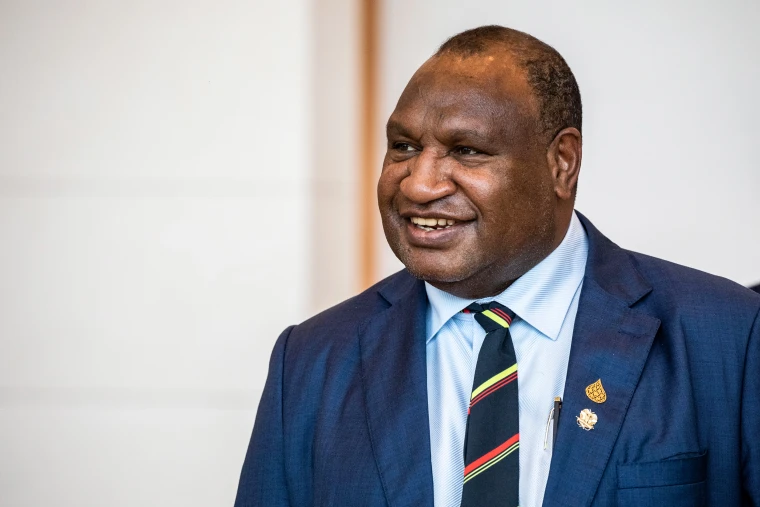Papua New Guinea’s Prime Minister has not committed to backing Bougainville’s independence — saying it could set a “dangerous precedent in a nation of so much diversity” and that a proper process must be followed.
It comes six months after former New Zealand Governor-General Sir Jerry Mateparae was sent in to try and resolve a stalemate between the leaders of PNG and Bougainville.
Prime Minister James Marape reaffirmed, however, that PNG’s police and defence force would never again step foot in Bougainville.
Marape was in New Zealand last week to sign a refreshed statement of partnership with the New Zealand government.
Asked whether he supported Bougainville’s independence, Marape said: “here’s a process that will facilitate the peace process.
“I can’t pre-empt the outcome of the process.”
TVNZ Q+A host Jack Tame asked what his personal position was on Bougainville’s independence, and whether he supported it in principle.
Marape said he had a duty to defend what was written in PNG’s constitution.
“Which is to say you don’t support Bougainville independence, in principle?” Tame asked.
Marape said: “You don’t necessarily have to put words into my mouth… I’m entitled to reserve my opinions.”
It has been more than 20 years since the last New Zealand peacekeepers left Bougainville. The conflict was fought between PNG government forces and the Bougainville Revolutionary Army from 1988 to 1998. It ended with a peace agreement establishing the Autonomous Bougainville Government.
In 2019, a non-binding referendum was held in the region. Voters could choose greater autonomy or independence; 98.3% chose the latter.
Bougainville had set a deadline of September 2027 for independence. However, the PNG Parliament has yet to table the results. It was due to be tabled in 2023.
In September, former Defence Force chief Sir Jerry was nominated mediator to try and resolve that impasse.
RNZ reported both sides were planning to meet several more times before their June deadline. Bougainville’s President Ishmael Toroama said his region had done its part in the peace process, and that it was up to the PNG Government now.
Asked if Sir Jerry’s involvement had helped things move along, the Prime Minister said it was “part of the process” and “Bougainville leadership appreciates that process must be deployed”.
“It’s not Bougainville versus PNG, a colour versus another colour, a language versus another language. It’s a series of, a set of languages in Bougainville versus over 800 languages in Papua New Guinea, all having their own traditional governance and worldview.
“Fifty years ago, we were isolated from each other. Today, we conglomerate our tribes into one sovereignty.”
Marape said PNG was one of the most diverse countries in the world, and other regions in the country could see “Bougainville setting pace” with its efforts towards independence.
“Many forget” that the current peace had only come about through fighting, he said.
“So we have so much prevalence of guns also in other parts of the country. Other parts of the country can fight with the national government and say, ‘All right, let’s choose peace’.
“And part of that could be a referendum for independence. That is a dangerous precedent in a nation of so much diversity,” Marape said.
He said he needed to think about the future and the standards he was setting.
“In the time between now and when we’re dealing with the rest of Bougainville, we’re trying to entrench the rest of the country into absolute clarity in law that no one must talk about autonomy and move to independence at the same breath.”
The Prime Minister said he continued to worry about security in Bougainville.
“What happens if lawlessness emerges into time? Because PNG defence and PNG police will never step into Bougainville ever again.
“Scars are too big. We don’t want that scar to reopen again.”
RNZ reported that, after a fatal gun fight in Buka in February, Bougainville’s President said people needed to take responsibility for their actions.
“This is the type of mentality that will make Bougainville weak and susceptible to a lack of positive progress and tangible development,” he said.













